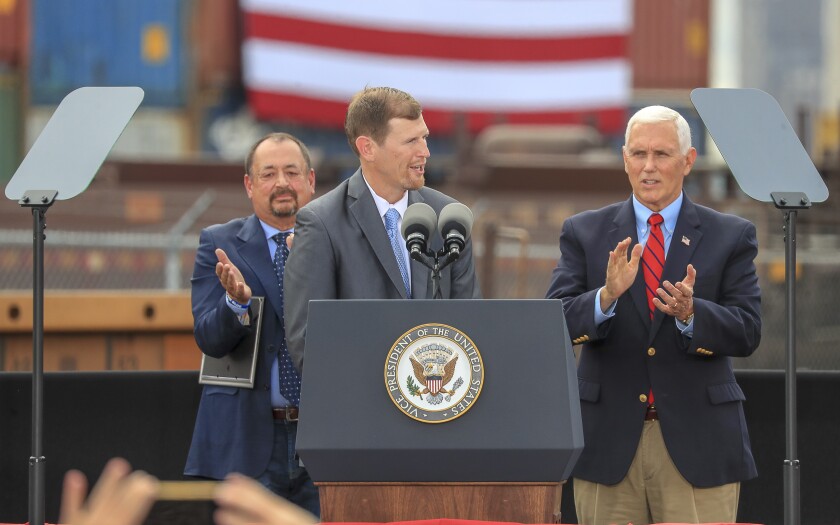TWO HARBORS — A group of Two Harbors citizens are organizing a recall of Mayor Chris Swanson.
Todd Ronning, of Two Harbors, told the News Tribune that “a couple of dozen people” are involved in the effort and expects to bring a petition forward “in the near future.”
ADVERTISEMENT
“It’s people coming forward that are really concerned with the pattern of behavior that we’re seeing in our elected officials and we think we deserve better than that,” Ronning said.

Ronning said the informal group’s discontent began in August 2020 when Swanson joined a and speaking at a rally in Duluth with then-Vice President Mike Pence.
Ronning called that “quite clearly a violation of the city code.”
According to the ’s section on code of conduct and ethics policy: “It is unlawful for any Elected Official, Appointed Official or Employee to use an official City title or designate employment with the City in political advertisements, endorsements or speeches.”
Opposition to Swanson has intensified since January when it surfaced he appeared on a podcast to discuss his plans for an underwater hotel in Lake Superior, had a website where he used his title as mayor to attract investors to the underwater hotel and had outlined plans to fund city projects using cryptocurrency in an interview with the New York Times.
The city’s ethics policy bans elected and appointed officials and employees from using their “official capacity” to make a statement or comment to media outlets without the prior approval of the City Council.
It also said officials and employees “shall not use his or her official position to solicit privileges or special treatment.”
ADVERTISEMENT
In public comments during Monday’s City Council meeting, Luann Udenberg, of Two Harbors, said she believes the citizens of Two Harbors should consider a recall of Swanson.
“I believe the mayor has exhibited a pattern of behavior that shows a stunning lapse in judgment, to put it mildly, on multiple fronts and going way back, for which he is completely unapologetic and shows no signs of understanding or remorse,” Udenberg said. “I can only conclude that this behavior will continue with more collateral damage for the city. Chris, I think you’ve disgraced and disqualified yourself as mayor.”
According to the , a recall petition can move forward if 20% of the registered voters in an officer’s constituency sign a statement of removal that outlines “allegations of malfeasance or nonfeasance.”
There were 2,241 registered voters in Two Harbors the morning of the 2020 general election, meaning almost 450 voters in the city would have to sign the petition for it to be considered by city administration. If the signatures are gathered and city staff verifies them, a proposed ordinance is sent to the City Council, which must then take action. If the official does not resign in five days, the council must schedule a recall election where the ballot would have one yes or no question: “Shall (name of elected official) be recalled,” according to the charter.
If a majority of voters mark yes, then the City Council fills the position with an appointment if there are less than two years left in the term or call a special election if there are more than two years left in the term.
Swanson’s term is up in January 2025.
Swanson did not respond to the News Tribune’s request for comment. He has previously said city policy bars him from speaking with the News Tribune.
ADVERTISEMENT
City Attorney to write opinion on possible violations
The City Council on Monday unanimously approved having City Attorney Tim Costley provide an opinion on whether Swanson’s comments and actions on the underwater hotel and cryptocurrency plans violated city code, city charter or the city communication policy.
The Minnesota Attorney General’s Office had previously declined to issue an opinion on whether Swanson violated state statute.
“There are several components of this that go outside of the statutory opinions, and I think we we're still hoping to continue to get clarification — that’s what I hear from constituents and others,” said Councilor Cathy Erickson. “So I would just continue to support making sure that we’re able to provide that information to those folks that are seeking that as well.”
Ultimately Swanson joined the others in approving the measure but not without objecting first.
Swanson falsely claimed the Attorney General cleared him of any wrongdoing because there was no contract or financial interest.
In an email to the News Tribune earlier in February, John Stiles, deputy chief of staff at the Office of the Minnesota Attorney General, clarified that it declined to issue an opinion not because it determined there was no financial interest, but because the office does not issue opinions on hypotheticals and that it does not interpret city codes or charters.
by
According to the letter, which Stiles sent to the News Tribune, "There have been no contracts proposed to the City regarding the subject of the communications.”
ADVERTISEMENT
That would make the question a hypothetical, Stiles said.
The letter also said that the Attorney General’s office "does not construe the meaning of terms in city charters and local ordinances and resolutions" when issuing opinions.
Costley said that meant it was up to him, at the council’s request, to weigh in on whether those were violated.
“There are four things that could be covered, city code, city charter, city communication policy and state statute — four things. The attorney general took a look at it and said, ‘Well, the only one we’re going to talk about is state statute. We’re not going to render an opinion because we don’t think we have sufficient facts to find there was a violation of state statute,’” Costley said. “‘(The Attorney General’s Office) said, ‘it’s going back to the city attorney to render or deal with the other three issues.’”
When Swanson responded he focused on the Attorney General Office’s use of “hypothetical.”
But Costley maintained that only applied to state statute and that the letter left it up to the city attorney to consider any violations to “code, resolution and charter,” which he said, is different than a hypothetical and urged Swanson to read the Attorney General’s letter.
“(The letter) used the word ‘hypothetical,’” Swanson said. “It’s called gossip.”
ADVERTISEMENT
“I’m not going to argue with you, Mr. Mayor,” Costley said. “The Attorney General’s opinion is what it is.”









